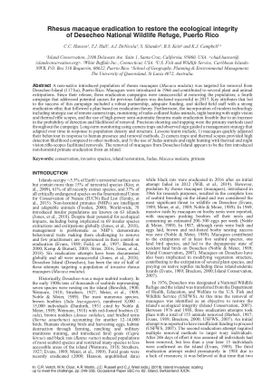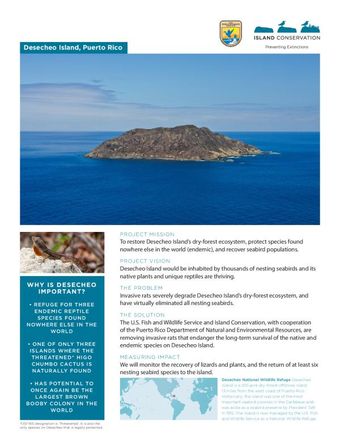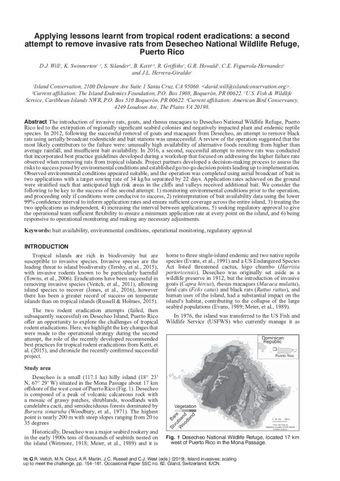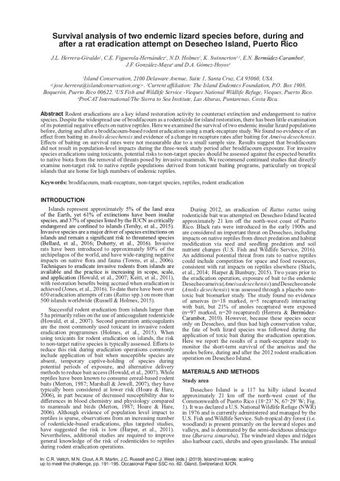Rhesus macaque eradication to restore the ecological integrity of Desecheo National Wildlife Refuge, Puerto Rico.
- Description:
- A non-native introduced population of rhesus macaques (Macaca mulatta) was targeted for removal from Desecheo Island (117 ha), Puerto Rico. Macaques were introduced in 1966 and contributed to several plant and animal extirpations. Since their release, three eradication campaigns were unsuccessful at removing the population; a fourth campaign that addressed potential causes for previous failures was declared successful in 2017. Key attributes that led to the success of this campaign included a robust partnership, adequate funding, and skilled ?eld sta? with a strong eradication ethic that followed a plan based on eradication theory. Furthermore, the incorporation of modern technology including strategic use of remote camera traps, monitoring of radio-collared Judas animals, night hunting with night vision and thermal ri?e scopes, and the use of high-power semi-automatic ? rearms made eradication feasible due to an increase in the probability of detection and likelihood of removal. Precision shooting and trapping were the primary methods used throughout the campaign. Long-term monitoring using camera traps and observed sign guided a management strategy that adapted over time in response to population density and structure. Lessons learnt include, 1) macaques quickly adjusted their behaviour in response to human presence and removal methods, 2) camera traps and thermal scopes provided high detection likelihood compared to other methods, and 3) the use of Judas animals and night hunting with thermal and night vision ri?e-scopes facilitated removals. The removal of macaques from Desecheo Island appears to be the ?rst introduced non-hominid primate eradication from an island.
- Display date:
- 2019
- Collections:
- Secretariat of the Pacific Regional Environment Programme (SPREP)
- Publisher:
- International Union for Nature Conservation (IUCN)
- Content partner:
- Secretariat of the Pacific Regional Environment Programme (SPREP)
- Availability:
- Not specified
-
Copyright status: All rights reservedFind out more about what you are able to do with this itemThis item is all rights reserved, with means you'll have to get permission from Secretariat of the Pacific Regional Environment Programme (SPREP) before using it. For more information, please see our use and reuse page.What can I do with this item?Non-infringing useNZ copyright law does not prevent every use of a copyright work, and this item may be hosted by an international institute or organisation. You should consider what you can and cannot do with a copyright work.No sharingYou may not copy and/or share this item with others without further permission. This includes posting it on your blog, using it in a presentation, or any other public use.No modifyingYou are not allowed to adapt or remix this item into any other works.No commercial useYou may not use this item commercially.
Related items
Welcome and warm Pasifik greetings
The information on this site has been gathered from our content partners.
The names, terms, and labels that we present on the site may contain images or voices of deceased persons and may also reflect the bias, norms, and perspective of the period of time in which they were created. We accept that these may not be appropriate today.
If you have any concerns or questions about an item, please contact us.



